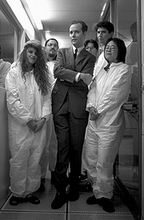During Wednesday’s lunch discussion, we talked about this
perplexing statement from one of Andrew Fellow’s lectures: “The now, the present,
is the only place where Reality exists.” Fellows is making a strong claim—that
reality is found in the midst of relationship- and that Real reality must be
experienced in the present. As you can imagine, it took us the full 1.5 hour
lunch discussion time to attempt to unravel this.
Fellows’ excellent lecture focuses on the distinctions that
philosopher Martin Buber makes between “I-Thou” relationships and “I-It”
relationships. An “I-It” relationship is a relationship in which we relate to
another person based solely on what they can do for us, for how they make us
feel. An “I-Thou” relationship is one in which we appreciate, listen to, and live
in a perpetual state of wonder as we encounter another person’s “otherness.” In
a sense, an “I-It” relationship is viewing and relating to another according to
his/her use value, whereas an “I-Thou” relationship is viewing and relating to
another based on a deep conviction that the other is inherently valuable (not just valuable because of what he/she can
do for you). “I-Thou” relationships are hard, so we slip in between these two
modes of relating. We often objectify those who “serve” us in society (waiters,
janitors, cashiers) according to an “I-It” way of relating. We see them merely
as people put in place to make our lives function smoothly, to help us get what
we want. How hard would it be to take a moment to actually stop, look into the
other’s eyes, speak directly to them, acknowledging their humanity?Even these
fleeting interactions can move from the realm of “I-it” to “I-Thou.” But we are
culturally trained to focus merely on getting what we want, and getting it is
quickly as possible.
The “I-It” relationship model is not practiced simply in
consumer transactions; sometimes, a supposedly “deep” or “real” interpersonal
relationship becomes an act of consumption. We see the other as someone to
complete us, to fulfill our needs, to “fix us” (as the annoying Coldplay song
about codependence says). The other person’s importance solely lies in what
he/she can give us. In this sense, our supposed friend or beloved becomes an
object whose purpose is to please us, to give us pleasure. An “I-Thou”
relationship is not without pleasure—but the pleasure it engenders is from
finding joy in the other person’s being—and even finding joy in serving the
other person—as opposed to looking to the other as a means to the end of our
individual happiness.
Another way that relationships can easily slip into an “I-It”
model is when we attempt to create the object of our supposed friendship or
love in our own image. We can easily project our own image onto theirs and
supposedly love them because they fit our needs to exactly. Of course,
projections that deludes us into believing another looks and behaves like us
does not meet our true needs (which are to be sharpened and challenged, among
other things) but lead us to deeper narcissism. Sufjan Stevens’ complex album The Age of Adz is the story of such an “I-It” relationship. The album begins
with Stevens proclaiming “I do love you” multiple times. What follows is a
jagged, chaotic, frenzied and beautiful mess that reflects the mind of the
lover as he navigates the relationship. The album ends with the following
confession that this relationship was not love, but objectification and
narcissism:
“I never meant to cause you pain
My burden is the weight of a feather
I never meant to lead you on
I only meant to please me, however
And then you tell me, boy, we can do much more
Boy, we can do much more
Boy, we can do much more together
Boy, we can do much more together
I'm nothing but a selfish man
I'm nothing but a privileged peddler
And did you think I'd stay the night?
And did you think I'd love you forever?
And then you tell me, boy, we can do much more
I got to tell you, girl, I want nothing less
Girl, I want nothing less
Girl, I want nothing less than pleasure
Girl, I want nothing less than pleasure
I got to tell you, boy, we made such a mess
Boy, we made such a mess
Boy, we made such a mess together
Boy, we made such a mess together
Interestingly, Stevens' album tells a parallel
story of the inner world of schizophrenic folk artist Royal Robertson. The
“love” relationship that Stevens depicts becomes a kind of delusional
schizophrenia as he projects his own reality onto his lover.
When talking about this song with a good friend
several years ago, he made a poignant, thought provoking remark: “Don’t Christians
do that with Jesus? Project themselves onto Him?” I do not remember the exact
words—but the gist was that perhaps Christians were projecting their own image
onto God. Objectifying Him. This insightful and honest question came from a
friend who is agnostic—so the question is perhaps, on a deeper level, whether
there is a real Jesus or if He is a complex web of our projections.
I do believe that Jesus is real, that He existed as
a historical human being, God incarnate entering our time-constricted history.
But I also believe that we often project our image on Him, make the
relationship into an “I-It” one rather than an “I-Thou” one. And of course, the
relationship between humanity and God is THE ultimate “I-Thou” relationship;
without this relationship to nourish us, is it even possible to move past
“I-It” relationships?
Douglas Coupland’s collection of short stories Life After God asks this very question
as it tells the fractured stories of those who have been unable to have Real
relationships, who resort to irony as a protective coating to prevent any more
pain. Coupland shows us that in this postreligious culture, even some who call
themselves “Christians” do just what my friend suggested: project their needs
onto Jesus, using him as an object to meet their present need instead of
recognizing the mystery, power, and reality of His brilliant Otherness.
I think it is clear that it is a human tendency to
objectify and consume the other, whether the other is another human being or
God. But I also believe that we were made for relationships. In our lunch
discussion we emphasized that the trinity is relational, the three parts of the
Godhead are constantly relating to one another. And if we are made in the image
of God, then we are inherently relational; this is both our model and our
nature. But our nature is also fallen—so we so often turn the wonderful
complexity and mystery of the other into an object to be consumed.
This takes us back to Fellows’ quote from “What is
a Relationship:” “The now, the present, is the only place where reality
exists.”
What does this have to do with either the “I-It” or
“I-Thou” models? I have also heard Fellows mention in his lectures that “The
present is where we meet God.” Of course, scripture tells us to “Be still and
know that I am God.” But what does Fellows mean by the notion that “Reality
exists” in the present?
A lengthy section in Pascal’s Pensees is perhaps helpful in this regard:
“We never keep to the present. We
recall the past; we anticipate the future as if we found it too slow in coming
and were trying to hurry it up, or we recall the past as if to stay its too
rapid flight. We are so unwise that we wander about in times that do not belong
to us, and do not think of the only one that does, so vain that we dream of
times that are not and blindly flee the only one that is. The fact is that
the present usually hurts.
Pascal’s
claim that we have a hard time keeping to the present, that the present “hurts,”
relates very much to his idea that we need to sit alone in a room, to be still,
in order to really think about our condition. We will soon find that it is “wretched,”
and that we need God (these are all Pascal’s ideas). We meet God in the present
moment. It is frightening because if we focus on the here and now we see our
own brokenness and need and incompleteness.
But how
does this relate to the “I-Thou” and “I-It” categories? I have gone over this
in my mind and realized that when we live in the past or future, both God and
others are objects within our minds; they are not living, dynamic Others. The
present is unpredictable. Buber claims that anytime we have a true “I-Thou”
encounter, we are changed. And this must happen in the present because we
cannot control it. If we live in the past or future, we are shaping things
into our own image—our romanticized notions of the past, our desires for the
futures.
I still
find Fellows’ comment a challenging, complex notion. But one worth chewing on: “The now, the present, is the only place where Reality exists.”
**I recommend listening to two of Andrew Fellows' excellent lectures if this topic interests you: "What is a Relationship" (quoted here) and "The Sacrament of the Present Moment."
Both can be found for free download here.


























